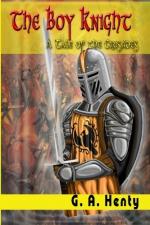“The plan is capital,” Cnut exclaimed. “We will do the proud Norman yet. How he will storm when he finds us masters of his castle! What then will you do, Sir Cuthbert?”
“We can hold the castle for weeks,” Cuthbert said, “and every day is in our favor. If we find ourselves forced to yield to superior numbers, we can at last retire through the passage I have spoken of, and must then scatter and each shift for himself until these bad days be past.”
CHAPTER XXIV.
The siege of Evesham castle.
Upon the day before starting out to head the expedition against the outlaws, Sir Rudolph sent word to the Lady Margaret that she must prepare to become his wife at the end of the week. He had provided two tiring maids for her by ordering two of the franklins to send in their daughters for that purpose, and these mingled their tears with Margaret’s at the situation in which they were placed. She replied firmly to the messenger of the knight that no power on earth could oblige her to marry him. He might drive her to the altar; but though he killed her there, her lips should refuse to say the words which would unite them.
The following morning, early, the castle rang with the din of preparation. The great portion of the mercenaries were encamped in tents outside the walls, for, spacious as it was, Evesham could hardly contain four hundred men in addition to its usual garrison. The men-at-arms were provided with heavy axes to cut their way through the bushes. Some carried bundles of straw, to fire the wood should it be found practicable to do so; and as it was now summer and the wind was blowing high, Sir Rudolph hoped that the dry grass and bushes would catch, and would do more even than his men-at-arms in clearing the forest of those whom he designated the villains infesting it. They had, too, with them several fierce dogs trained to hunting the deer, and these, the knight hoped, would do good service in tracking the outlaws. He and the knights and the men-at-arms with him were all dismounted, for he felt that horses would in the forest be an incumbrance, and he was determined himself to lead the way to the men-at-arms.
When they reached the forest they were saluted by a shower of arrows; but as all were clad in mail, these at a distance effected but little harm. As they came closer, however, the clothyard arrows began to pierce the coarse and ill-made armor of the foot soldiers, although the finer armor of the knights kept out the shafts which struck against it. Sir Rudolph and his knights leading the way, they entered the forest and gradually pressed their invisible foe backward through the trees. The dogs did good service, going on ahead and attacking the archers; but, one by one, they were soon shot, and the assailants left to their own devices. Several attempts were made to fire the wood. But these failed, the fire burning but a short time and then dying out of itself. In addition to the fighting men, Sir Rudolph had impressed into the service all the serfs of his domain, and these, armed with axes, were directed to cut down the trees as the force proceeded, Sir Rudolph declaring that he would not cease until he had leveled the whole forest, though it might take him months to do so.




